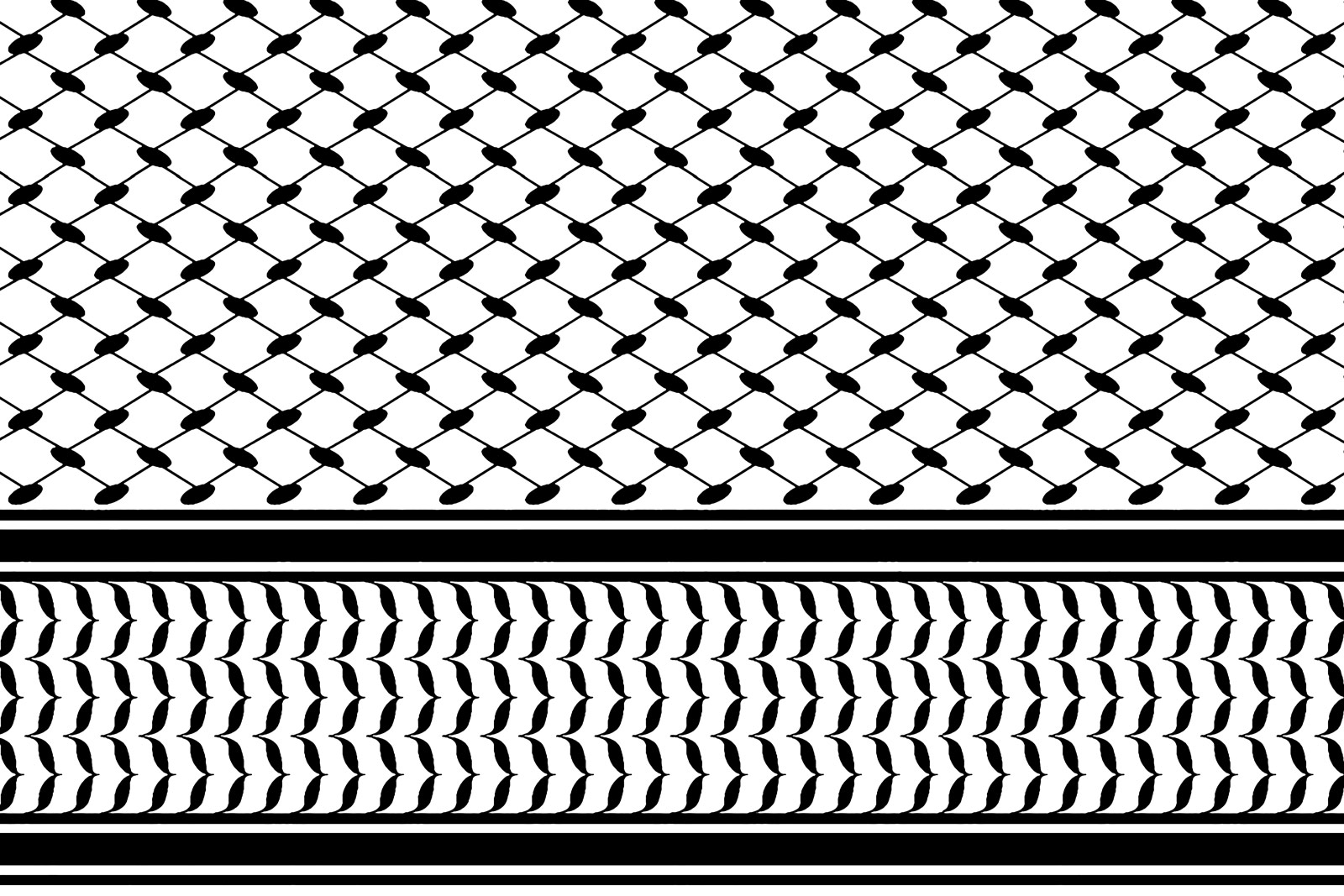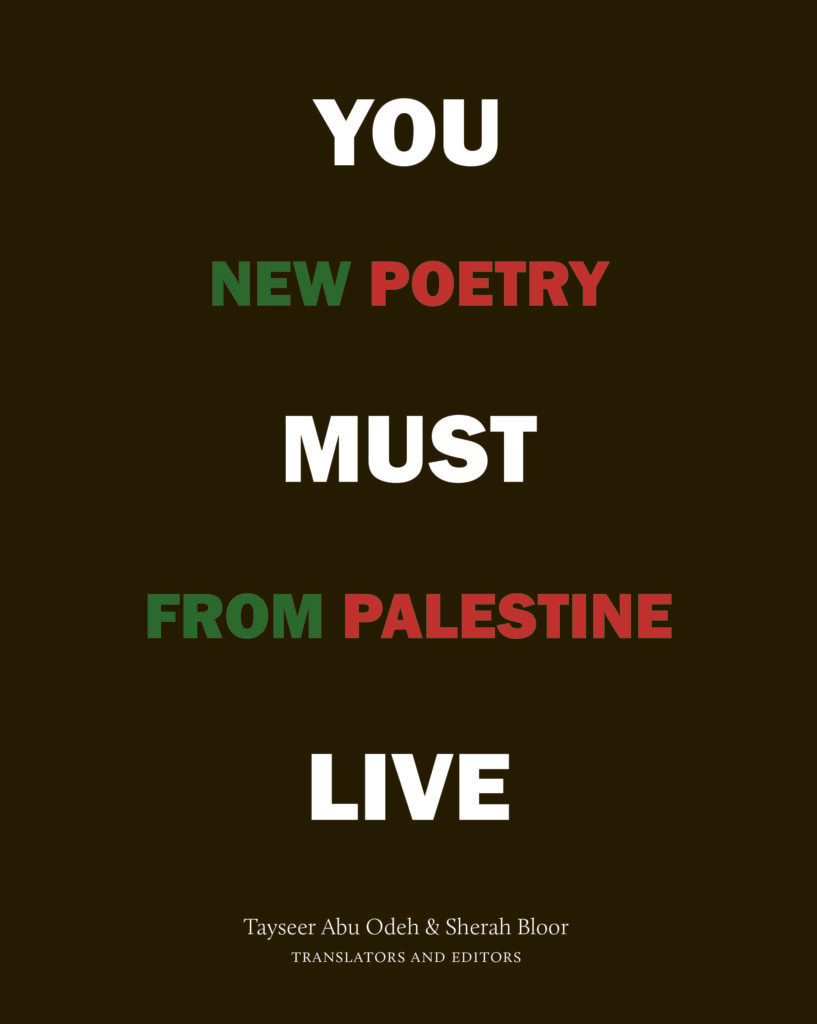Blood-Soaked Shirt

Each poem in You Must Live (Copper Canyon, 2025) is accompanied by the year and place of its composition. Forty-three times, in small, faint italics: Gaza, 2024. Sometimes the West Bank. Sometimes a few years before that. It’s a convention you see most often in editions of writers long dead, when scattered drafts are painstakingly reassembled in a variorum edition. Or in collections of letters, when you peer over the shoulders of the dead as they tell each other how each day was with them. In the pages of this anthology, as chronological time eddies and ruptures around trauma, as scenes of actual deprivation are braided with sensuously rendered memory and imagination, and as poets address those dead and those about to be with equal loving plainness, the heartbreak is, momentarily, lightened; the murdered turn to us, and open their eyes, before falling back to sleep.

You Must Live: New Poetry from Palestine
Sherah Bloor and Tayseer Abu Odeh (Editors & Translators)
Copper Canyon Press, 320pp
These are poems that lean on dream and prayer more frequently, and painfully, than most anglophone work. Since in Gaza, now, hunger brings no food, nor grief the dead child back, these poets turn for solace toward the shadowy worlds that poems can create.
Look, my friend, at this insatiable space even universes can’t fill. It feeds on reveries stored up in dreamers’ reticence. (Othman Hussein)
I’m in heaven — dancing before a beaming gate. It will open. (Haider al-Ghazani)
And we have no father
to draw us closer
to our dreams.
Is it time then? Must the poems
end? (Yusra al-Khatib)
Dreams are the cousins of poems. They are most gorgeous when we can tell they’re doing strange work which we can’t quite understand; when they kintsugi the cracks in unbearable reality; when they deny, for a breath, the reality of reality. How often, here, does the poem become a way of talking with someone who cannot, in life, answer us, or a way of putting the dismembered body back together? “See, … I am now a happy child … whose family isn’t murdered” (Khaled Juma). The counterfactual is a wicked tool. It works here, in part, because it shows us how such extreme horror makes children of us all, and how even the imagination, the poet’s only treasure, also can be starved. Juma’s poem ends:
When the war is over
I won’t search for my lover’s grave.
I won’t write poems about her.
I’ll pretend I left her. That I didn’t love her.
I will criticize her hair.
I will criticize the way she spoke —
her eyelids drooping when she said I love you.
We can sense the great strain with which Juma maintains the fiction of control, which is here simple denial, and we feel the despair welling up through consciousness as the unforgettable scene breaks through the frame in the last line.
In this way the reader often feels the horror of the ongoing genocide in its negative, or through traumatized, dissociative mental states, or through the shards of elegy that have sunk into the marrow of these poems, so that even expressions of joy or love become unbearably sad. (“Marry me! / Marry me!” — Kifah Al-Ghusin). But these are also poems that bring readers in the West the grim news they already half know, if knowledge is what short form video and anesthetized newspaper denials produce. By contrast, when a poem helps us slow time, in the drip-drip of short lines, how fully we construct a world from the barest details, as Anes Ganema’s speaker does, trying to reproduce what was lost:
With bricks I dig.
My cheeks gaunt like raised graves.
I sketch my house
by the dry riverbed.
Or in Jabir Sha’ith’s “Traces of the Swarm,” here in its entirety:
No coffee left in the coffeepot.
Embers turning to ash, ash whirling up into the unruly wind.
Beside me, I see a locust hovering above
The stove. I see nothing else.
Then a lone ant searching the sand for crumbs,
Searching for what the swarms left behind.
This barrenness of speech and world leaves no room for questions, no niche for the imagination—except, perhaps, its ironic traces of Old Testament imagery. That locust, that brief whirling of ashes in the wind, are balanced here by neither revelation nor manna. A tiny ant reminds us of the vastness of the crime that has resulted in this elemental scene. Were it not for that single, situating word—Gaza—such a poem, stripped as it is of historical signifiers and rendering human life at its barest, echoes with all the haunted immediacy we find in the shattered lyrics of Archilochus or Du Fu.
Perhaps unexpectedly, and in contrast with some other recent anthologies of Palestinian-American poetry such as Heaven Looks Like Us (Haymarket 2025, ed. Abraham and Hindi), anger and protest are not the dominant stances of many of these poems. That the word “Israel” occurs neither in the texts of these poems, nor in the careful introduction supplied by translator-editors Tayseer Abu Odeh and Sherah Bloor, is striking. Even as they detail the unthinkable living conditions of their contributors, nearly all of whom remain in Gaza, and thus had to reply to queries from editors from their phones, as they trekked from one “safe zone” to another, Gaza’s destruction is rendered in the passive voice: universities “have been destroyed,” “careers have been continually obstructed by the occupation.” This careful phrasing seems to be connected to how Odeh and Bloor locate You Must Live as a contribution to a “global poetry of witness.” By picking up a category developed by Carolyn Forché in the 1990s, such framing emphasizes a certain poetic continuity. For all their historical and geographical distinctness, the events that poets of witness describe are united by what Forché calls their categorical “extremity,” and the poems they produce connect “the personal and the political.” The continuity of such a project contrasts with, for example, Abraham and Hindi’s declaration that they “are writing from the event horizon of another world,” or, more pointedly, “beyond witness and into with-ness.”
“Since in Gaza, now, hunger brings no food, nor grief the dead child back, these poets turn for solace toward the shadowy worlds that poems can create.”
As I moved through the startling, heartbreaking poems of You Must Live, I wondered to what degree these two poetic projects — poems leveled at clear targets, featuring explicit political statement on the one hand, and plainer, more personal records of trauma felt in the body, the mind, and in the community on the other — were necessarily exclusive. In the complex coalitional politics on the United States left, the genocide in Gaza has made yet more visible poetry’s increasingly important role in articulating timely, communal responses to crisis. In contrast, if we accept the category of a “global” poetry culture, its political task is not less pressing, but its timeline is rather longer. Odeh and Bloor make this point by articulating how poets in Gaza both develop and shatter the Arabic wuquf ‘ala al-atlal tradition (“meditation on a ruined abode”), insisting that if this genocide is unprecedented, these poets still find precedents. Indeed, it is a tribute to the richness and great variety of these poems that they support both ways of reading: as reports from a singular horror, and as contributions to a long dark theme.
Most of the poets may be new to those familiar only with the poetry of the diaspora, but again and again I had the experience of being stilled or delighted by a selection, then scurrying off into the internet to seek out more. One approaches an anthology of very recent work, especially one hastened through the publishing process by the pressure of relevance, with a more local set of expectations — that it should speak meaningfully to its topic and to the shared moment, while making allowances for the impossibility of grasping the shape of history as it bears down. But poems such as Nema’a Hassan’s “To Create a Cloud” or Al’a al-Ghoul’s “Smoke and Mirrors,” by seeking out figures for the limits of vision and for the unreal half-possession that comes over the human animal in desperation, flash in and out of this genocide, this century, with sad authority. “I smoke too much / so I can’t be seen in the dust of war,” Hassan writes, besieged by explosions felt before they can be registered: “So many amputated hands trying to shake mine./ The coffeepot shakes on the fire.” Ending, the poem breaks open to reveal a buried addressee, the dark core of a particular “you” amid so much ambient tragedy:
Winter will be here soon.
And all the rooftops have decamped.
And I have been drenched in death.
How will I meet you now.
The impossibility of meeting the loved dead, or of finding a room to speak with those still alive when your home has been leveled and taken and when every gathering is a potential target, is a recurrent anguish in You Must Live. By staging a chorus and a conversation, an anthology itself offers a small, papery solution: arranged in chorus, near each other, the bereavement of these voices doubles and is lessened. Yusra al-Khatib’s “The Dervish and I” so moved me in part because its loneliness never seeks to be healed by its dialogue form. Rather, its thinly differentiated “I” and “you” slowly orbit each other, mold into each other, and stand together to look back on the ruins of the personal: “my recollections, / my exhausted dreams. / On the dock of our deserted port…” It is a twilit poem of oceans that, blockaded, no longer connect us, and it deploys the settler language of possession in gestures so empty that the idea of possession becomes meaningless— “Your waves lap at my suffering. / You read your sea’s panegyrics.” Eventually, gorgeously, as the I shifts and stiffens, we seem to be swimming posthumously back to the poem we’re reading, through a maze of impossible subjunctives on the other side of death.
They did not throw
my blood-soaked shirt
before my father’s eyes
for him to find me.
If he could find me
I would know where I am.
I return to the poem.
I still have my sight.
I will tell the stories
of our ancestors.
Perhaps the critic’s most important task is to locate those moments when criticism is meaningless, and to know when to fall silent.
Noah Warren is a poet and critic. His books of poetry are The Complete Stories, published by Copper Canyon in 2021, and The Destroyer in the Glass, chosen by Carl Phillips for the 2016 Yale Series of Younger Poets.

